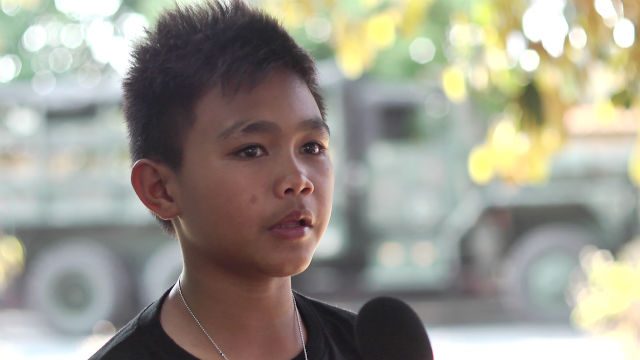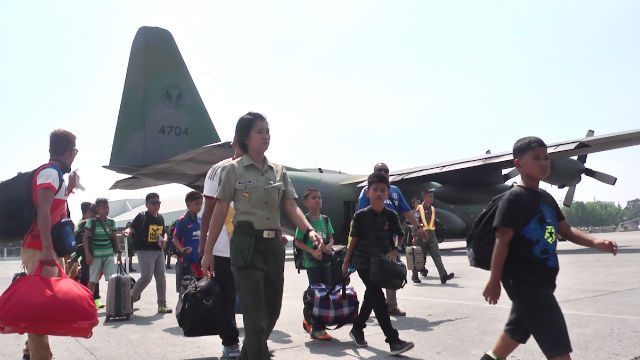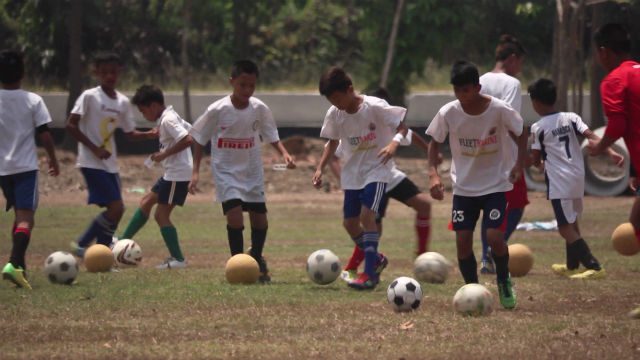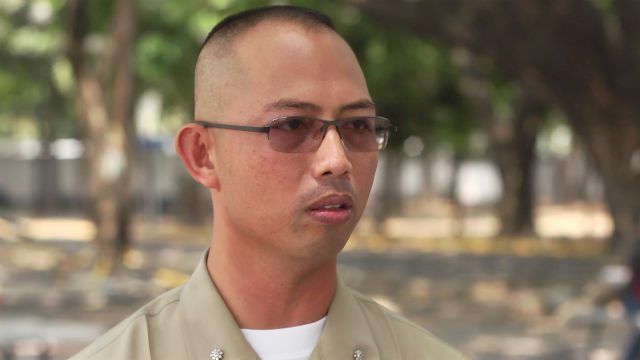SUMMARY
This is AI generated summarization, which may have errors. For context, always refer to the full article.

MANILA, Philippines – Before learning football, 13-year-old Jericho Blas did not have a clear-cut goal in his life. He describes himself as a typical “basagulero” in his school.
“I would punch my classmates for no reason. I didn’t take my studies seriously because I didn’t know what it was for,” Jericho said.
But after learning football, Jericho, who hails from Jolo, Sulu, said, he has realized what he wanted to do with his life. He wants to be a professional football player so he can help his family.
“Beyond the moves and skills, football taught me to be disciplined and to focus on my studies. My friends say I became a better kid after I learned the sport,” he added.
This is what the Football for Peace movement, an effort started by the Philippine Marines in 2011 to teach good values to the disaffected youth of Sulu through sports, has given children from conflict areas across the country: the chance to dream and see beyond their provinces.
And it’s not only the children who learned to dream big.
One of the mentors helping train the kids from Basilan is former mayor Anwar Abdul Majid of the town of Hadji Muhtamad. According to him, the program has given the parents in their communities hope for their children’s future.
“Now, we want our children to be varsity players for Ateneo and La Salle. We are overflowing with gratitude to the marines for this program,” the former mayor said.
He added: “In Basilan, we’re popular for the conflicts in our communities. But this program has given the children – even those from the most conflict-afflicted communities – a chance for a better future.”
#FootballForPeace
On Monday, April 13, more than 220 kids from the marines’ football clinics across the country were sent to Manila to participate in the Football for Peace tournament. They arrived in C-130s and they will be billeted in the army and marines’ headquarters in Fort Bonifacio for the entire week.

What started as the marines’ pastime eventually became their advocacy. From having only one football for 100 kids in Sulu, the program has expanded to other provinces like Palawan, Tawi-Tawi, Cotabato, Sultan Kudarat, and Zambonga. The Philippine Army has also joined the marines’ efforts.
Lt Col Stephen Cabanlet, who initiated the program, said they’ve seen the positive effects of the sport on the children.
“The kids in Basilan, Sulu, and Tawi-Tawi showed great change. They are able to enjoy their childhood through the sport. Second, their impression toward the marines has changed. They now want to contribute to attaining peace and development in their communities,” he said.
While football is their main avenue for inculcating good values to the children, Cabanlet said making the kids good football players is only a secondary goal.
“If one kid becomes the ring-bearer of peace, maybe we can change the mindset of individuals fighting. We are shaping the kids’ perspectives and characters. The number one priority is to teach them how to love our country, how to love their god, and be disciplined Filipinos,” Cabanlet added.
The power of dreaming
Most of the children participating in the games are first-timers in Manila. Throughout the week-long activities, they will have field trips to malls and museums, places they’ve never seen in their areas.

“We want to give the kids a glimpse of what is life outside Mindanao. This will also reorient them about the essence of sportsmanship, camaraderie and having a harmonious relationship with other participating teams,” said Cpt Michael Ramirez of the Civil Military Operations group of the Philippine Army.
Ramirez said he believes the exposure the kids get from participating in the football for peace program will teach them to aim higher and pursue their dreams.
“It’s very important to teach children to dream because they are our future. The desire to be successful needs to be inculcated in their minds. They’ll see a world beyond the farmlands in their communities. They’ll see a better future because of sports,” he added.
Help needed

The Football for Peace Movement has received the Quill Award for effective communication in March 2015 for its efforts to reach out to the youth.
Cabanlet added, however, that there is still much to be done for the program. The marines’ football clinics still need a lot of sports equipment.
“The AFP cannot do this alone. We are already operating outside of our mandate as it is. We continue to campaign for balls because the balls are the symbols to sustain the program. Without the balls, we don’t have ‘weapons’ to bring to the kids,” he said.
Rappler, through a crowd-sourced campaign, donated 1,200 footballs to the program, which helped the Marines surpass the original target of 1,000 balls. In 2014, Chevrolet Philippines donated 2,400 indestructible balls to the marines.
More help is needed to support the children’s meals this week.
“We need people who have a heart to sponsor the kids’ food. Most of them are first-timers in Manila, and haven’t eaten in a fastfood chain. It’s a little thing but this experience would make these kids aspire for development in their communities,” Cabanlet added.
He concluded, “It’s a small step we can do for the change these kids will create in their communities.” – Rappler.com
If you’re interested to support this advocacy, please contact Lt Col Stephen Cabanlet at 0917-535-9379.
Add a comment
How does this make you feel?
There are no comments yet. Add your comment to start the conversation.